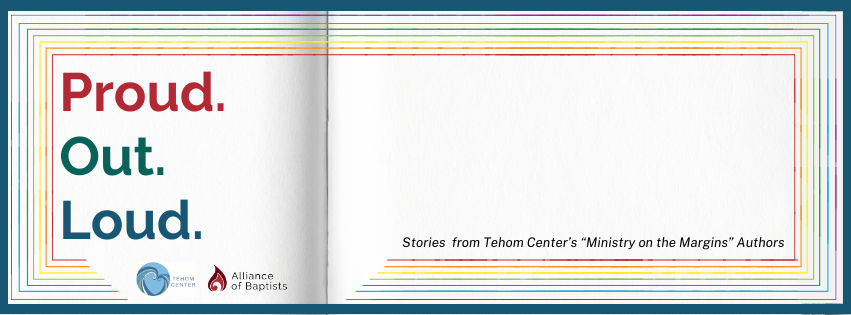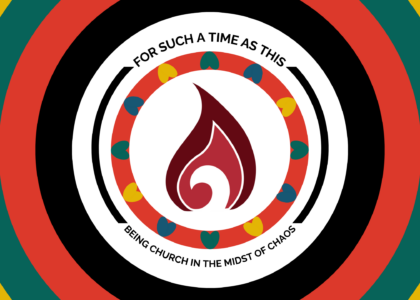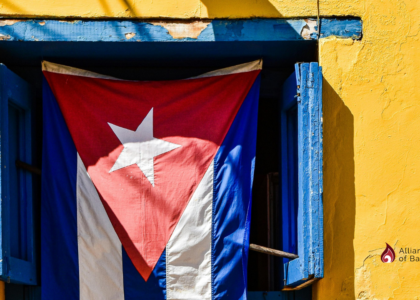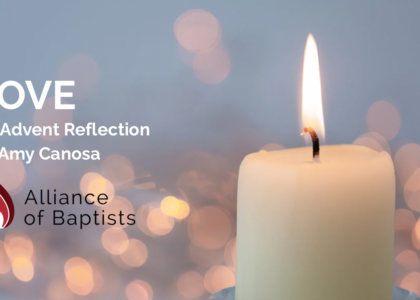By Angela Yarber
I ducked as an offering plate whizzed past my head. Clad in a stodgy clergy robe, a rainbow stole draped over my narrow shoulders, I stood in a sanctuary that seated 2,500. I was pastor of an “open and affirming” church, which is essentially religious jargon claiming they welcome and affirm queer people, something most churches prohibit. I mean, they had hired me, a queer clergywoman, as pastor.
And I’d suffered the consequences. A thick hate mail folder bulged in my filing cabinet. Sometimes the letters described in detail the way my flesh would smell when I burned in hell; a couple included death threats. But that didn’t do me in. We activists wear such threats as some kind of twisted badge of honor. It wasn’t the external discrimination—levied by preachers and politicians—that caused me to resign. Nope. It was the internal, underhanded, invalidating sexist and heterosexist microaggressions from within a community that claimed to honor and support queer people.
For my own mental, spiritual, and now physical health—those offering plates are heavy, people—I decided to leave.
I felt like such a failure. Creative, queer ministry was what I’d dedicated my life to; it was my calling; it was what I studied for eleven years of higher education. An undergraduate degree in religion led to seminary, which paved the way for a PhD where I studied the role of feminist and queer bodies in world religions.
Even more, I felt the church had failed me. I knew that most churches didn’t affirm queer people. In fact, they were antagonistic, hateful, and exclusive. But I had hope in so-called “reconciling” ministries aimed at welcoming the LGBTQIA+ community. Though many amazing queer ministries exist within myriad wisdom traditions, my experience was that religion still had to be translated through the lens of heteronormativity. I didn’t want to reconcile myself to those institutions, but to reimagine spirituality altogether.
“Stay and fight,” some queer congregants begged me.
But I’d fought valiantly for nearly fifteen years, and those stained-glass walls were caging me in, contorting me into a version of myself that was depressed, anxious, and sick. I didn’t want to live like that. And I certainly didn’t want to raise my child in that world.
After nearly fifteen years as a pastor, I realized that institutional religion was toxic for queer women like me. So, I left to traverse the American landscape with my wife and toddler, researching the lives, legends, and legacies of revolutionary queer women of color. My story—and the stories of these revolutionary women—are captured in my recent memoir, Queering the American Dream.
The way this liberation has manifested in my life, one decade after leaving the church and traveling throughout a post-gay-marriage America has actually shocked me. It has shocked me how my calling and vocation have played out after all these years in the most subversively queer way.
With an enormous green canoe strapped precariously to the top of a 2004 Explorer, we towed our new home—a pop-up camper named Freya—from North Carolina in the direction of Vermont for three days of solid rain. Needing respite, we paused at a campground in Lake George.
A retired woman in a star-spangled blouse met us at the gate.
Her shockingly white bouffant rose like the Adirondacks from above the red, white, and blue sequined visor enveloping her wrinkled temples. Patriotic reading glasses were perched at the tip of her nose, and her lips were smudged crimson. What truly stole the show was the bedazzled American flag fanny pack bulging above her crisp, white pleated shorts.
Waving scarlet fingernails in welcome, an overloaded gold charm bracelet jangling from her bony wrist, she clutched a clipboard while welcoming us to the campground.
After a friendly check in, we gave her the incredibly abbreviated version of our travels.
Quit jobs.
Sold home.
Discernment travel for two years.
Toddler in tow.
She gasped, her accent laced with Long Island:
“Do you mean to tell me that you two girls are traveling all over the country for two years in a pop-up camper with a toddler? Have you lost your minds? Where are your husbands?!”
With absurd smiles stretched across our road-weary faces and rain soaking our hair, my wife and I stood side by side, our toddler babbling from the rear-facing car seat in the canoe-laden SUV just behind us. No husbands in sight.
Because they don’t exist. Because we’re married. To each other.
At the time, it made us chuckle. After every single campground host for two years requested that my “husband back the camper into our spot,” I wasn’t really laughing anymore. In that first campground, and in more than I can even remember in the following two years, the felt invalidation of my calling and my queer family intermingled, stirring up doubt, grief, and imposter syndrome.
For the next decade I pondered, created programs, researched, published books, taught courses about queer spirituality, and questioned what my vocation is now that I’ve left the pulpit. Whether it’s offering plates lobbed at queer pastors or campground hosts who dismiss our very existence, the need to queer life, work, family, and spirituality remains a constant theme in my book. Both the writing and publishing of Queering the American Dream have led to a liberation that I never could have dreamed.
The way this liberation has manifested in my life, one decade after leaving the church and traveling throughout a post-gay-marriage America has actually shocked me. It has shocked me how my calling and vocation have played out after all these years in the most subversively queer way.
You see, after seeing the ways in which my calling was truly lived out through writing and publishing books, it dawned on me that the root word for preach and the root word for publish are actually the same in Greek: Κηρύσσω (kerusso). To proclaim, preach, or publish. I realized that my pen had become my pulpit, publishing my prophetic calling.
But I couldn’t keep that calling to myself, so I created Tehom Center Publishing, a press publishing feminist and queer authors, with a commitment to elevate BIPOC writers. Not only do we publish (preach) at no cost to authors, but we also offer equitable coaching programs empowering authors in book writing, book marketing, and authorpreneurship.
Taking it one step further, I knew that other marginalized ministers have felt Κηρύσσω (kerusso) stirring within, desiring to write and publish books the church and world so desperately need. So, I developed Ministry from the Margins Books, an annual cohort that gathers marginalized ministers and coaches them through writing, publishing, and marketing a book for the global good.
Whether it’s my own book, Queering the American Dream, Tehom Center Publishing, or the new Ministry from the Margins Books program, we’re reimagining a better world, a world where queer folx have access to living abundant lives. That is what it means to queer the American dream, to preach, proclaim, and publish the good news. And that’s something no politician or preacher can take away.
*****
If you’re interested in participating in Ministry from the Margins Books, contact Dr. Yarber by June 20 at info@tehomcenter.org

Rev. Dr. Angela Yarber is an award-winning author of eight books and the founder of Tehom Center Publishing, a press publishing feminist and queer authors, with a commitment to elevate BIPOC writers. With a PhD in Art and Religion and as an Affiliate Professor of Women in Religious Leadership at Drew University, her work has been focused in Forbes, NPR, HuffPo, Ms. Magazine, the television show Tiny House Nation, and more at www.angelayarber.org. You can connect with her on Facebook, Instagram, TikTok, and her website.





Recent Comments